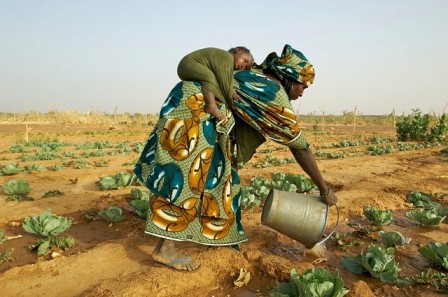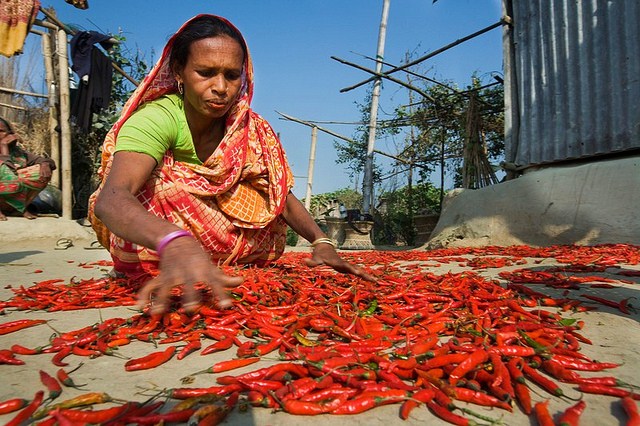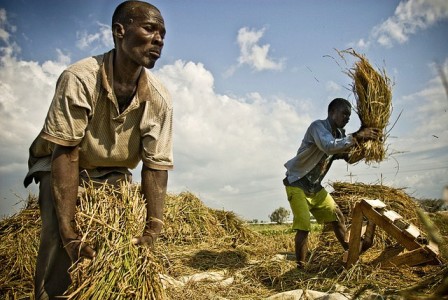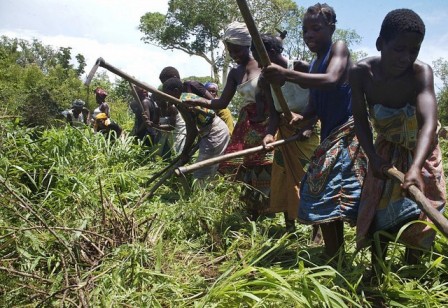Oxfam Report: ‘The Global Food System Is Broken’

NEWS JUNKIE POST
May 31, 2011 at 7:50 am According to a new report from Oxfam, a broken food system and environmental crisis are reversing decades of progress in the fight against global hunger. Oxfam projects that spiraling food prices will create millions of hungry people unless we radically transform the way we grow and share food. Starting June 1, 2011, Oxfam will launch a global campaign called GROW.
According to a new report from Oxfam, a broken food system and environmental crisis are reversing decades of progress in the fight against global hunger. Oxfam projects that spiraling food prices will create millions of hungry people unless we radically transform the way we grow and share food. Starting June 1, 2011, Oxfam will launch a global campaign called GROW.
 In the report published on May 31, 2011, Oxfam identifies the various symptoms of our broken food system: growing hunger, flat-lining crop yields, lack of water and fertile soil, and rising food crisis. The organization says that we have entered a new age of crisis where depletion of the earth’s natural resources and increasingly severe climate change impacts will create millions more hungry people. Naturally, poor countries will be affected dramatically more than industrialized nations. Oxfam projects that the price of staple foods such as maize, already at an all time high, will more than double in the next 20 years. Half of this price increase will be directly linked to climate change. The world’s poorest people, who spend 80 percent of their income on food, will be those hardest hit.
In the report published on May 31, 2011, Oxfam identifies the various symptoms of our broken food system: growing hunger, flat-lining crop yields, lack of water and fertile soil, and rising food crisis. The organization says that we have entered a new age of crisis where depletion of the earth’s natural resources and increasingly severe climate change impacts will create millions more hungry people. Naturally, poor countries will be affected dramatically more than industrialized nations. Oxfam projects that the price of staple foods such as maize, already at an all time high, will more than double in the next 20 years. Half of this price increase will be directly linked to climate change. The world’s poorest people, who spend 80 percent of their income on food, will be those hardest hit.
 Oxfam predicts that by 2050 demand for food will rise by 70 percent. Yet our capacity to increase food production is in decline. The average growth rate in agricultural yield has declined by almost 50 percent since 1990, and it is set to decline yet further in the coming decade. Oxfam’s GROW campaign will expose government failure that is propping up the broken food system and the group of 300 to 500 companies that benefit from it. Four global companies control the movement of the world’s food. Three corporations: Archer Daniels Midland, Bunge and Cargill control around 90 percent of the global grain trade. Their speculative activities drive volatile food prices and they profit from it. For example, in the first quarter of 2008, at the top of a global food crisis, Cargill’s profits were up by 86 percent. In 2011, Cargill is heading for its most profitable year on record. Needless to say, this speculation on food prices will further disrupt global food supplies.
Oxfam predicts that by 2050 demand for food will rise by 70 percent. Yet our capacity to increase food production is in decline. The average growth rate in agricultural yield has declined by almost 50 percent since 1990, and it is set to decline yet further in the coming decade. Oxfam’s GROW campaign will expose government failure that is propping up the broken food system and the group of 300 to 500 companies that benefit from it. Four global companies control the movement of the world’s food. Three corporations: Archer Daniels Midland, Bunge and Cargill control around 90 percent of the global grain trade. Their speculative activities drive volatile food prices and they profit from it. For example, in the first quarter of 2008, at the top of a global food crisis, Cargill’s profits were up by 86 percent. In 2011, Cargill is heading for its most profitable year on record. Needless to say, this speculation on food prices will further disrupt global food supplies.
 “For too long governments have put the interests of big businesses and powerful elites above the interest of the seven billion of us who produce and consume the food. The G20 must invest in the 500 million small-scale farms in developing countries which offer the greatest potential for increasing global yields–and they must help them adapt to a changing climate. They must regulate commodity markets and reform flawed biofuel policies to keep food prices in check,” said Jeremy Hobbs, the Executive Director of Oxfam.
“For too long governments have put the interests of big businesses and powerful elites above the interest of the seven billion of us who produce and consume the food. The G20 must invest in the 500 million small-scale farms in developing countries which offer the greatest potential for increasing global yields–and they must help them adapt to a changing climate. They must regulate commodity markets and reform flawed biofuel policies to keep food prices in check,” said Jeremy Hobbs, the Executive Director of Oxfam.
Related Articles
- March 7, 2011 Overpopulation, Climate Change, Food Crisis, War: The Horsemen Of Apocalyptic Capitalism
- November 23, 2012 Occupy Strategy: Global Strike and Consumer Boycott Should Be on the Agenda
- January 3, 2015 Sustainable Ways to Feed the World Are Subverted by Corporations
- January 24, 2011 Tunisia, WikiLeaks And Food Crisis: Forces For A Global Revolution
- August 30, 2010 Climate Change: The Question Of Bread
- December 25, 2012 Photographs: Celebrate Christmas by Helping Homeless Near You
10 Responses to Oxfam Report: ‘The Global Food System Is Broken’
You must be logged in to post a comment Login












Pingback: === popurls.com === popular today